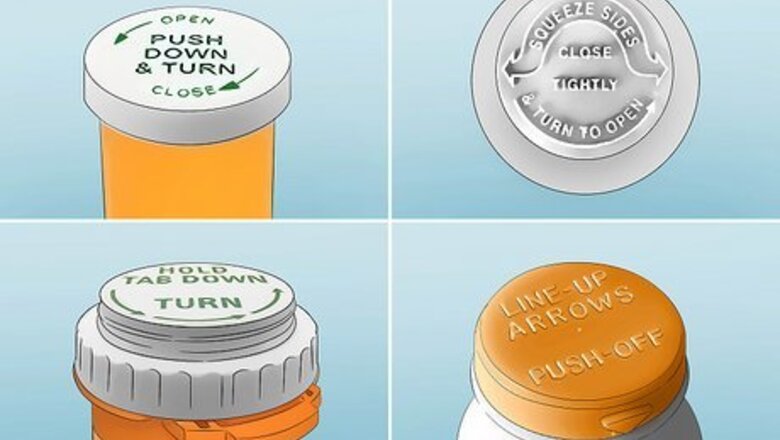
views
Standard Opening Solutions for Pill Containers
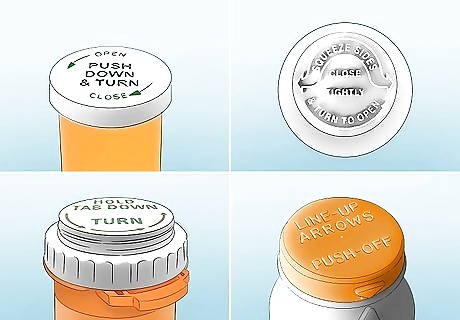
Check the cap to see which style it is. Place the bottle on a flat surface to ensure you get a good, even grip on the container. Then, read the directions on the side bottle to see how it’s designed to be opened. There are 4 possible types: push and turn down, squeeze the sides and turn, push down the tab and turn, and line up the arrows. For "push down and turn," the lid will have an arrow pointing down or a label that says "push." A "squeeze the sides and turn" lid will have grooves around the lid to help you squeeze and turn it. For "push down the tab and turn," the lid will have a small raised tab that says "push" and possibly arrows to indicate a turning motion. A "line up the arrows" lid will have an arrow pointing downward and another arrow on the lip of the container pointing upward.
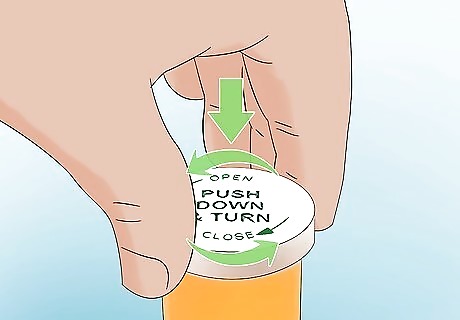
Push down and turn. Hold this bottle with one hand. With the other, grasp the cap and press down, turning the cap to the side at the same time. Keep pushing down until the cap unlocks and rotates, then twist it open. This is how you would open a bottle of Tylenol, for example, which has a "push down and turn" bottle.
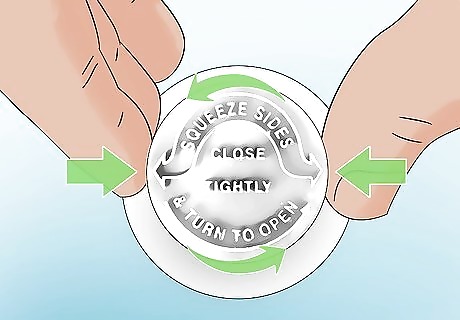
Squeeze and turn. This bottle lid usually features two smooth panels on either side. Look for them, grasp the cap by those two smooth areas, and squeeze them both. Then, twist the cap and turn it until the bottle top comes free. There are notches inside both the cap and mouth of these bottles holding the cap in place. Those notches avoid one another when you squeeze the cap, and the cap slides free.
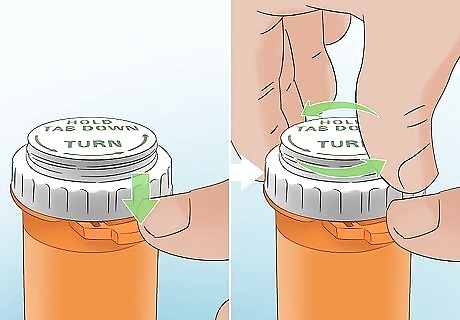
Push down the tab and turn. If you have a "push down the tab and turn" cap, apply pressure to the tab on the side of the bottle cap with the palm of one hand. Then, twist the cap so that you fully unscrew it from the bottle. A lot of pharmacy prescription bottles use this design. There's a tiny angled piece attached to the tab that holds the cap in place—but when you push the tab down, the angled piece lowers and unlocks. Remember: if you struggle with childproof locks due to arthritis or other conditions, ask your pharmacist to deliver prescriptions with non-childproof lids.

Line up the arrows. With this bottle cap, find the two small arrows visible on the side of the cap and the bottle’s neck. There's a ridge around the mouth of the bottle to keep it shut, except where the two arrows align. Turn the cap until its arrow lines up with the arrow on the lip of the container. Then, lift up the lid, and it will come free, granting you access to your pills!
Using a Hard Edge
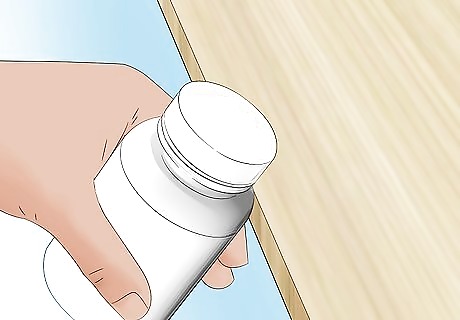
Rest the bottom of the cap against the top edge of a hard surface. Ensure that the table or counter is between the bottom of the cap and the rest of the bottle. You'll have leverage that you can use to lift the cap up despite the childproof lock on the bottle. This method can work with any bottle type, as long as there's enough space between the bottle's cap and body to accommodate the hard surface. A wide-edged table is ideal since it gives you the most leverage when using this method. However, you can do this with any hard-edge surface in your home.
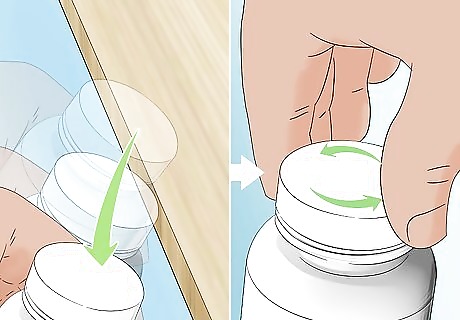
Pull the container in a quick downward motion. Use your combined force and the resistance from the hard surface to separate the cap from the medicine bottle. Listen for a "click" sound as the cap releases when you pull the container down.
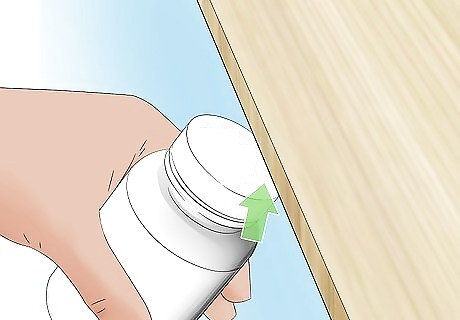
Place the cap underneath the edge of the table, alternatively. Keep holding the pill bottle in one hand, and pull it upwards against the hard surface. This will cause the layers of the bottle cap to separate. Continue pulling until the outer layer pops off, and you'll be left with an easy-open screw cap! Instead of a counter or table, you could also wedge a spoon under rim of the cap and press upwards until you hear a “click” as the cap comes loose.
Using a Flat Surface
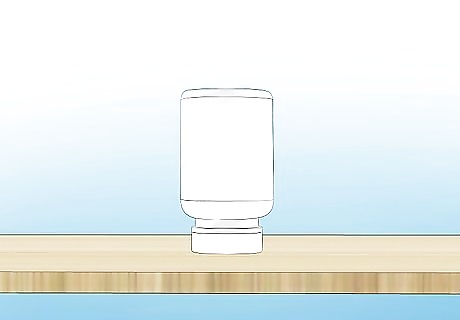
Find a flat surface and balance the bottle upside down on it. A table or counter would be ideal for this, though any hard, even surface will work. Hold the bottle down against the surface by the flat of its cap—use your stronger hand to keep the bottle in place if you have one. This method works with a “push down and turn” bottle since you need to apply pressure to the top of the cap to open it.
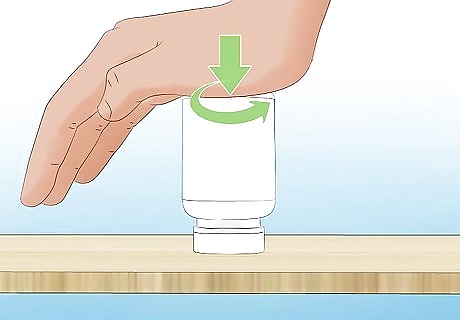
Press down with your palm and rotate the container. Apply moderate pressure to the base of the pill bottle as you push. Make sure the lid of the pill bottle stays motionless as you rotate; the friction from this will get the bottle to open despite the child-safe lock. Holding the cap in place with your other hand can help if you have the ability to use it. Alternatively, you can ask someone else to do it. You can also place a non-slip surface on the counter or table. A silicone baking mat or something with similar texture would work.

Keep rotating the bottle until you hear a clicking sound. This is your sign that the cap has been released! Hold both the cap and container together in one hand as you turn them back upright (so the cap doesn't fall off). Then, lift the lid off and you’re done! Hold the bottle close to your body while you rotate and keep a firm stance; this will help you engage more of your arm muscles, not just your hand and fingers.
Using a Rubber Bottle Opener
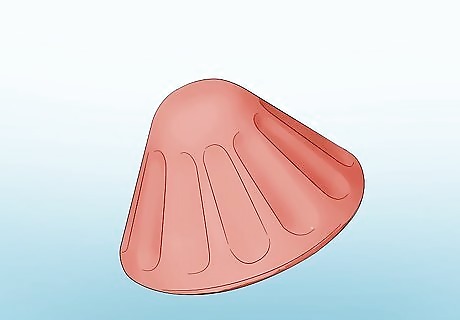
Grab a rubber cone-shaped bottle opener and place it on the bottle's lid. Hold the bottle in place with your other hand, or ask someone else to hold the bottle. Pick a bottle opener made of rubber with non-slip grooves, giving you a strong grip on the bottle. This works with any type of bottle cap, especially those that require you to push or twist the cap. It’s also a handy way to open a liquid bottle, since turning it upside-down or using a hard edge to pull it could spill the liquid. The Dycem Bottle Opener is designed for individuals with limited arm mobility, as it only requires you to use your fingers or the palm of your hand and light pressure to open a container. If you have an extra rubber mat, place it under the bottle to better hold it in place while you open it.
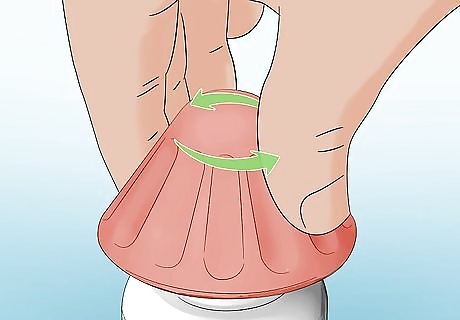
Rotate the bottle opener with your fingers or the palm of your hand. You'll only need to use minimal force because the bottle opener is helping you. Whichever part of your hand you use to move the bottle opener, its strong grip will allow you to open the pill container quickly and properly.

Use rubber gloves or a rubber grip pad alternatively. If you don't have a proper bottle opener on hand, either of these rubber products can produce the same effect. Grasp the bottle cap and rotate it with your fingers or palm, and the lid will come free.
Using a Thumb Tack

Push a thumbtack into the cap of a “push down and turn” bottle. Aim off-center and place the thumbtack halfway between the center and the edge of the cap. Press the thumbtack down while twisting to drive it through the cap, and then unscrew the cap once the thumbtack is in place. You can use this technique to open a “push and turn” bottle of Tylenol. “Push down and turn” bottles have two caps, an outer cap that moves freely and an inner cap that can only be unlocked when pressure is applied to the outer cap. Inserting a thumbtack into them disables the lock.
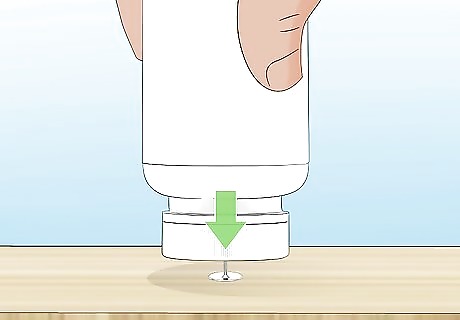
Turn the bottle upside down if the cap material is too tough. A hard surface can help you install the thumbtack if you naturally don't have arm strength. Place the thumbtack on a table or counter to balance upright, pointing up. Push the upside-down bottle straight down onto the thumbtack, using the table to help you apply pressure.
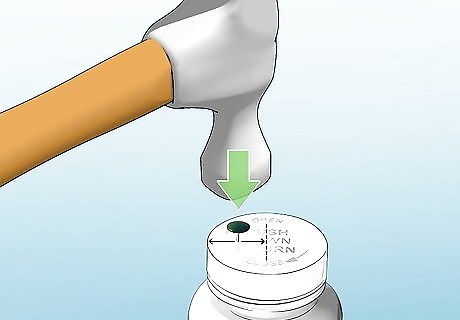
Use a hammer to strike the thumbtack into place. If all else fails to get the thumbtack into the bottle cap, grab a hammer and gently tap the thumbtack to pierce the outer and inner caps of the bottle with it. You can also use three thumbtacks, spread evenly around the sides of the cap, to keep the pressure even. As always, practice proper safety precautions when using a hammer. Wear goggles if you have them; look before you swing, grip the hammer's rubber handle firmly, and strike the thumbtack squarely.
Disabling the Childproof Lock for Future Use

Remove the tabs of a “squeeze and turn” cap with nail clippers. Once you open up a medicine container with a "squeeze and turn" cap, find the two small plastic tabs on opposite sides of the cap—these are what lock the cap in place. Using nail clippers, pinch off each tab so that the bottle cap screws into place normally but doesn't lock. Liquid bottles like cough syrup and mouthwash often have “squeeze and turn” caps, so this is a handy way to keep your liquid products accessible in the long term. Leaving the caps partially open exposes the pills to air and allows them to spill more quickly, so clipping off tabs is a more convenient workaround!
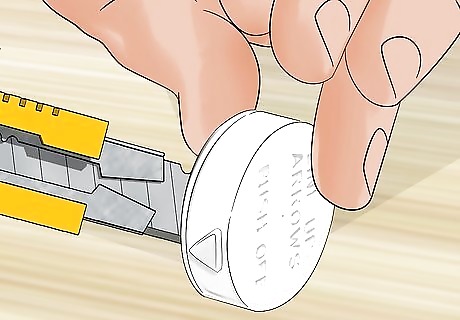
Shave the tab off a “line up the arrows” cap with a hobby knife. Get the lid off by lining up the arrows as usual. Locate the small tab inside of it opposite the arrow, and grip the cap firmly by the arrow side, so your fingers are well away from the tab. Shave away the tab completely with your hobby knife, and make sure you cut away from yourself slowly for maximum safety. For extra protection, consider wearing knife guards on the fingers holding the cap. Once finished, check that you can pop the lid at any angle, not just when the arrows are aligned.
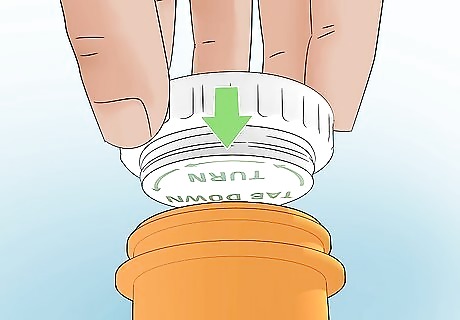
Screw on a "push down tab and turn" prescription bottle cap upside down. Many people don't realize that the typical prescription bottle has a built-in hack! Once you get the lid off one time, flip the cap over and screw it back onto the bottle. The other side of the cap is actually designed to fit the bottle—and it's a regular, easy screw-on lid without the child-safe lock.

















Comments
0 comment